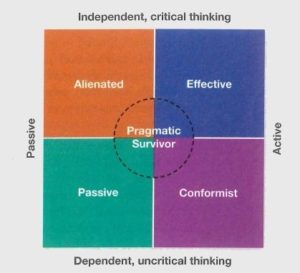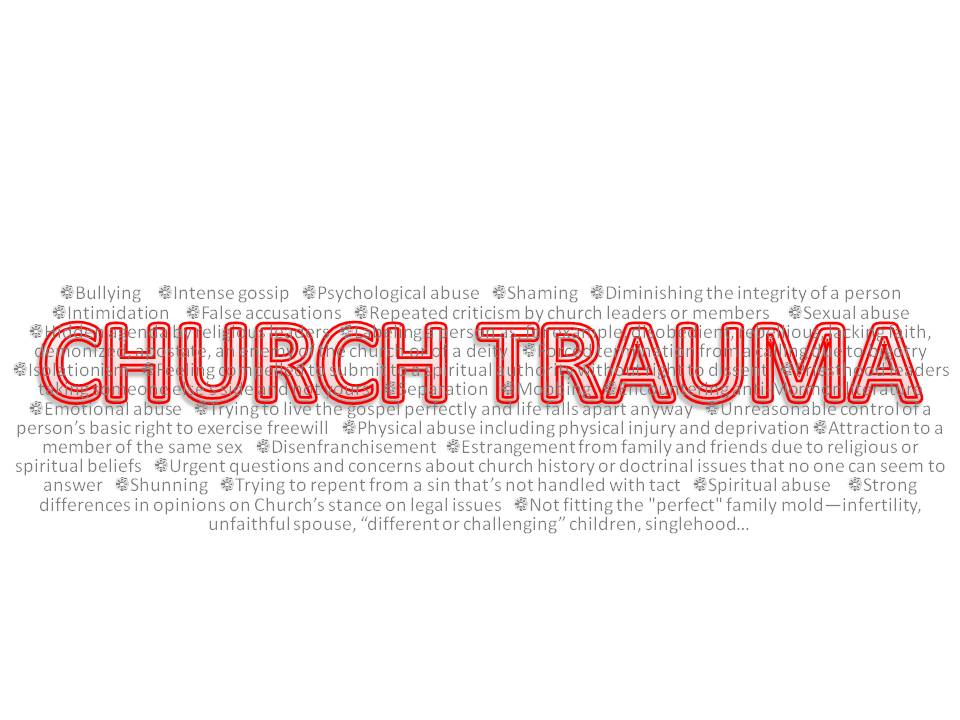Followers are Leaders!
By Dr. John Krupa
For too many of us, the word follower means take directions from those with formal authority and obey. We assume they are knowledgeable, moral, and have the power to reward or punish. This is a great recipe for instilling fear and codependency. Followers in religious and other organizations have some ideas regarding what constitutes ‘good leaders’ and ‘bad leaders’. Academic and commercial research is abundant in regards to leadership behaviors, styles, accomplishments, decision processes, organizational goals, and factors that influence decisions. One of the newer streams of research in organizational studies is ‘followership’. Let’s look at a basic model that suggests a shift in how we see our role as followers.
What does it mean to be an effective follower or a follower in general? Should LDS members, for example, blindly comply and conform to local leaders? Does a good follower use critical thinking yet defer to those with ‘legitimate’ (i.e., formal or positional power) when conflicts arise? What guides our decisions and provides wisdom as well as power? Do you go along with a subculture (e.g., Elder’s Quorum), spouse, friends, LDS.org, immediate needs, science, understood LDS norms (i.e., values, assumptions) or even selfish (i.e., emotional) demands? Many try to follow Jesus Christ, which is the ultimate source of wisdom and power. Still, in our flawed human condition, we struggle to work, worship and live within complex organizations that present conflicting demands on our loyalties.
I’d like to introduce a helpful model for self-analysis and introspection.
The exhibit below is based on the work of Robert E. Kelly.
Robert E. Kelley described five styles of followership categorized according to two dimensions:
First, critical thinking versus dependent, uncritical thinking and second, active versus passive behavior.
Independent thinkers are mindful of the effects of one’s own and other people’s behavior on achieving the organization’s vision. Dependent, uncritical thinkers fail to consider possibilities beyond what one is told; accepting the leader’s ideas without thinking. These two variables (critical/dependent thinking and active/passive behaviors) for the four quadrants of the model as well as five potential follower styles.
Let’s take a look at each follower style:

https://jasoceania.co.nz/articles/followership
- A conformist: a follower who participates actively in the organization but does not utilize critical thinking skills in his or her task behavior. I believe many ‘pew-sitting’ LDS members or TBMs fall within this quadrant. Many are not aware of the history and go along to keep the peace.
- A pragmatic survivor: a follower who has qualities of all four extremes (alienated, effective, passive, conformist), depending on which style fits with the prevalent situation. I call this ‘situational followership’; it’s less damaging to the individual and organization but not optimal.
- A passive follower: a person in an organization who exhibits neither critical, independent thinking nor active These folks just go with the flow.
- An alienated follower is high on the critical thinking dimension but very passive. I believe many LDS members who ‘quit and stayed’ fall within this quadrant; they stay to keep families together or out of fear and/or confusion.
- An effective follower: a critical, independent thinker who actively participates in the organization.
Effective followers are essentially effective leaders!
The locus of control is internal, not external. To become an independent thinker requires self-awareness and risk-taking. We learn about ourselves in relationships with others. We share our ‘hidden’ views and thoughts with those we trust. We ask others to share our ‘blind spots’ with us (i.e., those things they know about us but we don’t). We learn to subordinate our emotions to our deeper values – and I emphasize our freely chosen values, not the values we have passively accepted. Followers with an external locus of control believe ‘what’s out there’ controls their circumstances and decisions. Let me be very clear about being a victim; we can be a victim of other’s behaviors but we do not need to remain a self-victim by absolving ourselves of the freedom to make choices going forward! We can choose to become effective followers not alienated, conformist, or passive followers.
But, there’s a price to be paid – Courage is required!
Courage to Challenge
Effective followers know what they stand for and challenge mediocrity, indifference, and complacency. They express their ideas to their leaders – even though this might their status
Effective followers do not sacrifice organizational (e.g., the Gospel) or personal ethics to maintain harmony. They stand up when behavior contradicts the interest (i.e., mission and Christ’s values) of the organization or their integrity. Effective followers do not presume that a leader or an organization will provide them with security, permission to act, or personal growth. Followers initiate opportunities for personal fulfillment and use of their God-given capabilities.
The Courage to Participate in Transformation
Effective followers view change as a mutual experience and responsibility shared by members of the organization. They work toward constructive change efforts and challenge destructive processes, attitudes, and behaviors (including ignoring problems).
The Courage to Serve
An effective follower:
- serves by using talents, skills, and passion in accordance with conscience (not guilt, anxiety, fear)
- supports the leader’s decisions (when it’s based on principles)
- provides strength and encouragement to leaders and followers
- complements the leader’s abilities (and limitations)
The Courage to Leave (or stay)
Often organizational or personal changes create a situation in which a follower choose to leave. Physical, mental, emotional, and/or spiritual health concerns provide examples.
- If a leader or organization does not seek to learn, change, and better fulfill its mission, followers take their support elsewhere
- A person may go through difficult transitions, face abusive or neglectful situations (people) that require temporary or permanent removal from unhealthy or toxic situations. To passively tolerate abuse is to become part of that system and enable such behaviors to infect the climate with emotional contagion, which acts insidiously to shape attitudes.
Here’s the exciting news! Effective leaders want followers who challenge them because leaders make mistakes and they admit mistakes. Hundreds of studies with positive, effective, and happy organizations have concluded that great leaders want to be challenged! Why would leaders want to be challenged? Because they have humility and know their limitations; they want to encourage difficult conversations, emotional engagement, involvement, and commitment. This is the process of organizational learning and improvement!
So, what about bishops, stake presidents, and others who don’t want to be challenged? First, they will NOT experience optimal organizational climates, meaning, relationships built on trust, and authentic communication; each of these factors contributes to productive organizations (i.e., home teaching, missionary work, and other services). Second, they will create conditions that encourage a codependent culture and self-alienation, not the greatness that Christ intended for us to achieve. If followers are punished for challenging the status quo or specific events, they tend to revert to one of the follower styles we’ve discussed. A codependent culture is essentially the understanding that one must go along with those in control (generally through fear) at the expense of one’s deepest sense of self (i.e., one’s spiritual self).
One final thought. The highest level of maturity is interdependence, not independence. Although followers need to grow in their independence, they also need to value the independence and differences of others; this includes those who don’t agree with us. Perhaps the greatest challenge is to cultivate a win-win philosophy and offer leaders consideration and understanding. This does not imply agreement or enabling behaviors.
A win-win philosophy encompasses a broader time perspective; it’s not a mere event or ‘transaction’ between leader and follower. Showing empathy (not necessarily sympathy) for a leader’s weaknesses, fears, personal scripts, and desires to do their best with limited resources (i.e., training, time, and money) is part of the follower’s journey. We might do well to remember that love is a verb, not just a noun. Some of my greatest personal growth has come through learning to help my managers succeed and helping them to ‘manage up’ the hierarchical structure through understanding their views, pressures, and goals. In most cases, I’ve been fortunate to earn their respect when I used my talents to create a complimentary team. Courage, compassion, consideration, and the crushing power of information and God-inspired truths can lead us to the next steps in our personal and relational decisions.
Ultimately, we follow Christ through our conscience, with whatever degree of light we might possess. Followers must become leaders; the only other choice is some level of dependency. We need to tolerate and, perhaps, embrace human weaknesses; our own and others. We need to become active participants and deliberately contemplate what’s going on inside self as well as our organizations.
A great quote from Nelson Mandela:
Our deepest fear is not that we are inadequate; our deepest fear is that we are powerful beyond measure. It is our light, not our darkness, that most frightens us. We ask ourselves, who am I to be brilliant, gorgeous, talented and fabulous? Actually, who are you NOT to be? You are a child of God. Your playing small doesn’t serve the world. There’s nothing enlightened about shrinking so that other people won’t feel insecure around you. We were born to make manifest the glory… that is within us.
It’s not just in some of us; it’s in everyone. And as we let our own light shine, we unconsciously give other people permission to do the same. As we are liberated from our own fear, our presence automatically liberates others.
SOURCE: From the 1994 Inaugural Speech of Nelson Mandela.
If you’d like to read more, here’s an article that you might enjoy: https://hbr.org/1988/11/in-praise-of-followers
John Krupa Jr. – Bio
 John holds graduate degrees in business and counseling: MBA in Management; MA in Counseling, and DBA in Organizational Leadership. John is a marketing (branding) and leadership professor in the Graduate Studies Department at Johnson & Wales University, Providence RI. Prior to his teaching career, he was a sales/ marketing manager, and sales professional in the jewelry industry. He also helped manage his family’s Dunkin Donuts franchises while attending undergraduate studies. He is a very proud father and loves his granddog Gus (bulldog).
John holds graduate degrees in business and counseling: MBA in Management; MA in Counseling, and DBA in Organizational Leadership. John is a marketing (branding) and leadership professor in the Graduate Studies Department at Johnson & Wales University, Providence RI. Prior to his teaching career, he was a sales/ marketing manager, and sales professional in the jewelry industry. He also helped manage his family’s Dunkin Donuts franchises while attending undergraduate studies. He is a very proud father and loves his granddog Gus (bulldog).



